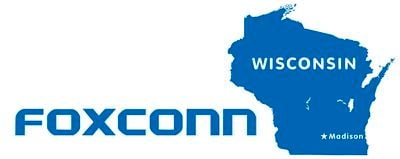Apple supplier Foxconn today said that it remains committed to its contract to build a display plant and research facility in Wisconsin (via Reuters). The company's comment comes a few days after Wisconsin Governor Tony Evers said that the state wanted to renegotiate the Foxconn deal, partly due to the belief that the Taiwanese company was not expected to reach its goal of creating 13,000 jobs in Wisconsin.

Foxconn's original goal for the project was to eventually employ 13,000 workers on the site, and today the company has confirmed that it "remains committed" to this plan. Foxconn initially announced the project in 2017 at a White House event alongside President Donald Trump. Governor Evers recently took office in January 2019, inheriting the deal to Give Foxconn $4 billion in tax breaks and other incentives.
“Foxconn’s commitment to job creation in Wisconsin remains long term and will span over the length of the WEDC (Wisconsin Economic Development Corporation) contract and beyond.”
Over the years, Foxconn's Wisconsin plant has gone through many iterations as the supplier faced new roadblocks and cost-cutting measures. The plant was designated as a TV display factory in its early stages, then pivoted to small to medium-size displays for smartphones, infotainment systems, and other "niche products".
In early 2019, Reuters reported that Foxconn would greatly scale back its plans to produce displays of any kind in Wisconsin and instead focus on research and development. The news came from Louis Woo, assistant to Foxconn CEO Terry Gou, who said Foxconn is "not building a factory" in Wisconsin.
According to Woo, the steep cost of making advanced screens for TV sets and other devices in the United States led to the decision. Around the same time, the company confirmed it had slowed its pace of hiring, down to about 5,200 people expected by the end of 2020.
As of now, Foxconn has fallen short of its employment goals in 2018, hiring just 178 full-time workers rather than the 260 it intended to for the year. The supplier has to meet certain hiring and capital investment goals under its current contract to qualify for tax credits in Wisconsin. With its inability to meet the 260 hiring target last year, it failed to earn a tax credit of up to $9.5 million.





















